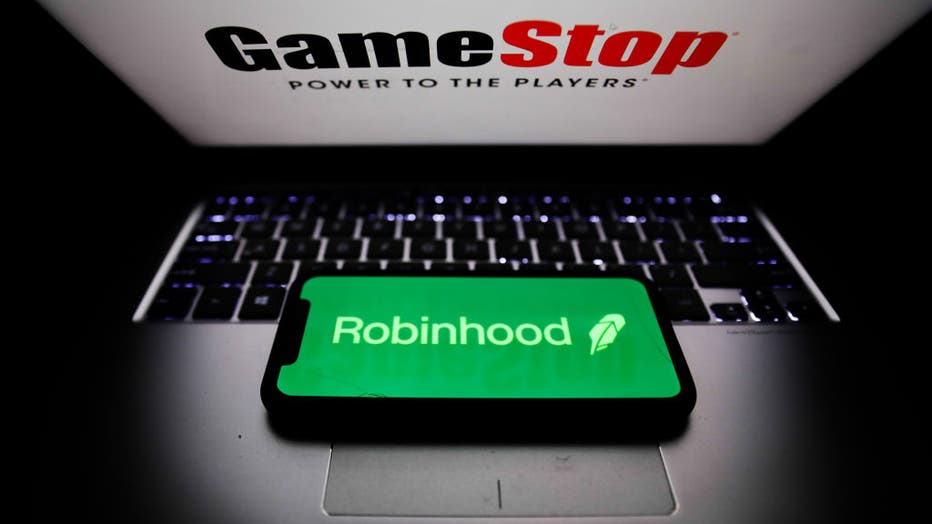CEO defends Robinhood at House committee hearing over GameStop saga
WASHINGTON (AP) - Key players in the GameStop saga are testifying to a House committee Thursday. Lawmakers are examining whether the wild swings in the stock price of the video game retailer exposed conflicts in the market's structure that can hurt unsophisticated investors.
The episode has been portrayed as a victory of the little guy over Wall Street titans, but not everyone is buying it. Lawmakers from both parties are among the skeptics.
GameStop shares soared 1,600% in January before falling back to Earth. The drama entangled huge short-selling hedge funds, a social media message board and ordinary investors wanting in on the hottest new trade.
RELATED: GameStop stock explained: Here’s what short selling is and why it’s shaking up Wall Street
Among those testifying remotely are Vlad Tenev, CEO of Robinhood, which operates an online trading platform that is popular with individual investors. In his opening testimony, Tenev defended Robinhood against allegations that trading restrictions it put in place disadvantaged those smaller investors in favor of bigger institutional clients.
The head of the Financial Services Committee, Rep. Maxine Waters, D-Calif., brusquely grilled Tenev on Robinhood’s restricting its customers ability to trade GameStop stock. She also asked Tenev about Robinhood's close relationship with Citadel Securities, which she maintains poses a conflict of interest.
At issue is the common practice in the securities markets of payment for order flow, in which Wall Street trading firms such as Citadel Securities pay companies like Robinhood to send them their customers’ orders for execution. In addition, platforms like Robinhood give the trading firms data on stocks its users are buying and selling.
Both Tenev and Ken Griffin, the CEO of Citadel, denied that Citadel had any role in Robinhood's decision to restrict trading in GameStop and some other volatile stocks.
Tenev said Robinhood imposed the trading restrictions solely to meet capital requirements set by regulators. Still, he apologized to Robinhood customers.
"Despite the unprecedented market conditions in January, at the end of the day, what happened is unacceptable to us. To our customers, I apologize, and please know we are doing everything we can to make sure this can’t happen again."
Also appearing is Keith Gill, who earned a handsome profit and a legion of online followers for making the case for GameStop shares on Reddit and YouTube long before the big surge in the price in January. Gill, known as Roaring Kitty on YouTube, is known for his cat-themed T-shirts and a bright red runner’s headband in widely followed videos.
For the hearing, Gill wore a jacket and tie, although the headband could be seen hanging on poster of a kitten with the words "Hang in There.
RELATED: Investment firms back down after Reddit thread sends GameStop shares soaring
As they question Tenev and other witnesses, lawmakers will look to see if there was manipulation of any kind in the GameStop trading frenzy or other conflicts that put smaller investors at a disadvantage.
"We don’t know whether it will just be warnings versus actual findings in terms of (stock) manipulation. That’s going to take time," Quincy Krosby, chief market strategist at Prudential Financial, said in an interview Wednesday. "It’s clear the concern is there. We’ll see how the (Biden) administration handles this."
Gill told lawmakers that he reaped a profit on his investment because he did his homework, and not because he touted the stock.
"The idea that I used social media to promote GameStop stock to unwitting investors and influence the market is preposterous," Gill said.
"My posts did not cause the movement of billions of dollars into GameStop shares. It is tragic that some people lost money and my heart goes out to them."
GameStop shares rose as high as $483 in January but reversed course this month and now trade around $45, still more than double where they traded at the start of the year.

Robinhood logo displayed on a phone screen and GameStop logo displayed on a laptop screen are seen in this illustration photo taken in Poland on January 31, 2021. (Photo Illustration by Jakub Porzycki/NurPhoto via Getty Images)
Small investors were initially seen as the winners after they mobilized against Wall Street heavies on the subreddit WallStreetBets. Their buying swelled the share prices of GameStop and other beaten-down companies beyond anyone’s imagination.
Not coincidentally, the rally inflicted billions in losses on the hedge funds that had placed bets that the stocks would drop, a practice known as short-selling.
Some of the lawmakers at the hearing have been critical of short-selling, although defenders of the practice say it’s a tool for uncovering a stock’s true value and hedging against possible losses.
RELATED: Reddit mob wields GameStop stock as weapon against hedge funds
Chicago-based Citadel stepped in with a few other funds to rescue Melvin Capital Management after it sustained billions in losses on its GameStop bets. Gabriel Plotkin, Melvin Capital’s founder and chief investment officer, also appeared at the hearing.
As the frenzy escalated, the acting head of the Securities and Exchange Commission said the agency is examining the trading restrictions imposed by Robinhood and other online brokerages as well as possible stock manipulation, and the role that short-selling may have played in GameStop’s extreme price swings.
RELATED: Amid GameStop and AMC frenzy, Citron Research discontinues reports on short selling
The panel’s senior Republican, Rep. Patrick McHenry of North Carolina, put forward conservatives’ view that the GameStop episode shouldn’t be used by Washington to bring new regulations on the markets.
Jennifer Schulp, director of financial regulation studies at the CATO Institute, to the panel, "By no means, though, should these events lead to restrictions on retail investors’ access to the markets."
___
AP Business Writers Matt O’Brien in Providence, Rhode Island, and Alex Veiga in Los Angeles contributed to this report.



